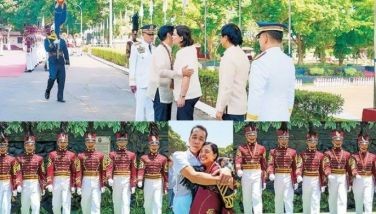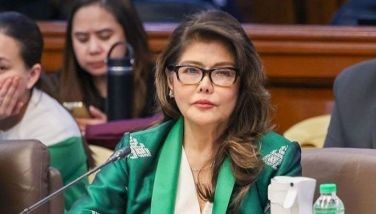UN: Rody has ‘striking lack’ of understanding of rights
MANILA, Philippines – The United Nations High Commissioner for Human Rights has lambasted President Duterte for allegedly undermining justice and human rights amid the killings of Filipino drug suspects.
“The President of the Philippines’ statements of scorn for international human rights law display a striking lack of understanding of our human rights institutions and the principles which keep societies safe,” Zeid Ra’ad Al Hussein said when he addressed the 33rd session of the world body’s Human Rights Council in Geneva, Switzerland on Tuesday.
Al Hussein urged the Philippines to allow the UN special rapporteur for human rights to visit the country.
Reacting to the condemnation, the Philippine government said the drug war was being waged by the Duterte administration with “firm adherence” to human rights principles, due process and the rule of law.
The UN rights chief highlighted the challenges confronting the international community and expressed particular concern over attempts by countries to block human rights scrutiny.
“Fair and impartial rule of law is the foundation of public confidence and security. Empowering police forces to shoot to kill any individual whom they claim to suspect of drug crimes, with or without evidence, undermines justice. The people of the Philippines have a right to judicial institutions that are impartial, and operate under due process guarantees; and they have a right to a police force that serves justice,” Al Hussein said.
“I strongly encourage the Philippines to extend an invitation to the Special Rapporteur (Agnes Callamard) on extrajudicial, summary or arbitrary executions. My office is ready to assist, including with respect to rule of law institutions and the prevention and treatment of drug use in accordance with international norms,” he added.
Clarification
In response, the Department of Foreign Affairs said the Philippines corrected Al Hussein’s report yesterday, noting President Duterte never empowered police officers to “shoot to kill” drug suspects.
The police have the right to defend themselves when their lives are endangered when drug suspects violently resist arrest, Ambassador Cecilia Rebong, the Philippines’ Permanent Representative to the UN in Geneva, said in a statement delivered on the second day of the session.
Rebong emphasized the ongoing campaign against illegal drugs was unparalleled in Philippine history and was “being waged under the leadership and direction” of Duterte with “a firm adherence to the rule of law, due process and human rights principles.”
The ambassador said the President, in fact, urged civil rights organizations to report any killings that were not in accordance with his pronouncements on the anti-illegal drug campaign.
The Philippine statement also noted the spike in the number of killings included deaths resulting from legitimate police operations and those carried out by vigilante elements as well as drug syndicates undertaking a purge among their ranks.
The government denounces and does not resort to extrajudicial or arbitrary executions, Rebong emphasized, and was gravely concerned about accusations purporting that the administration was tolerating such actions.
Rebong said the government was investigating the extrajudicial killings and was committed to bringing the perpetrators to justice.
She also said “police authorities take seriously allegations of its officers’ involvement in such activities, and follow established internal procedures for investigating and addressing such cases.”
Rebong asked the international community to support the Philippine campaign against illegal drugs to build communities conducive to every Filipino’s right to live in peace and dignity and attain a higher standard of living free of the menace.
DFA spokesperson Charles Jose said Rebong also handed to the UN rights chief an aide memoire elaborating on the Philippines’ “resolute and uncompromising” commitment to human rights being a state party to eight out of nine core international human rights conventions.
Rebong stated “the relentless” campaign against illegal drugs was being done due to the prevalence of use and sale of prohibited substances “in all strata of Philippine society, the increasing criminality in the streets, the involvement of top-ranking officials in the Philippine government, all of which has destroyed – and continues to destroy – the lives of millions of Filipinos, in particular the youth.”
The ambassador said the President was elected into office by 16 million Filipinos on a key platform of urgently addressing criminality, peace and order, and eliminating poverty in the country and the campaign against illegal drugs was part of his commitment to the Filipino people.
- Latest
- Trending



























